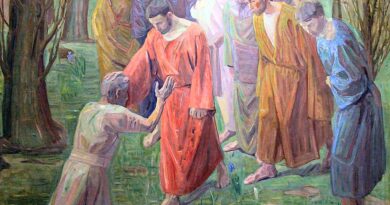Twenty-FourthXXIV Sunday of Ordinary Time
Massimo Palombella

In today’s Gospel (Mt 18:21-35) Jesus, when asked by Peter how many times it is necessary to forgive, says that forgiveness is to be granted “always” (this is the meaning of “seventy times seven”).
Once again Jesus challenges us not on specific things but on the global attitude of our life. In fact, being able to truly forgive is not just a matter of asceticism, but the fruit of a true journey of maturation where we learn to make “separations”, to go “beyond” to arrive to the truth within us. Every difficulty we have in forgiving, every resentment, anger and desire for revenge (as the first reading indicates, Sir 27:30 – 28:9), all this is always connected to our ancestral relationships, to those relationships that in our lives struggle to be harmoniously placed, resolved, ‘forgiven’, ‘overcome’.
The Lord challenges us precisely here. He invites us to “let go of our nets” (Mk 1:16), to “separate ourselves” from what implicitly keeps us still, chained in horizons that are not really ours, in order to be able to taste “life in abundance” (Jn 10:10).
To forgive “always” is then a challenge that implies accepting a journey that is not easy with as many steps forward and as many steps back, a “slow” and even, at times, tiring process, like all true things in our lives.
The Offertory antiphon of today’s celebration is taken from chapter 24 of the book of Exodus (Ex 24:4. 5) with the following text:
“Sanctificavit Moyses altare Domino,
offerens super illud holocausta, et immolans victimas:
fecit sacrificium vespertinum in odorem suavitatis Domino Deo,
in conspectu filiorum Israel.”
(Moses consecrated an altar to the Lord,
and presented thereupon burnt offerings and sacrificial victims;
he made an evening sacrifice as a fragrant offering to the Lord,
in the presence of the sons of Israel).
The attached music, in Gregorian Chant, is taken from the Gradual Triplex published in Solesmes in 1979. The interpretation is by the “Schola Gregoriana Choir F. Paër”.
A blessed Sunday and heartfelt greetings.


